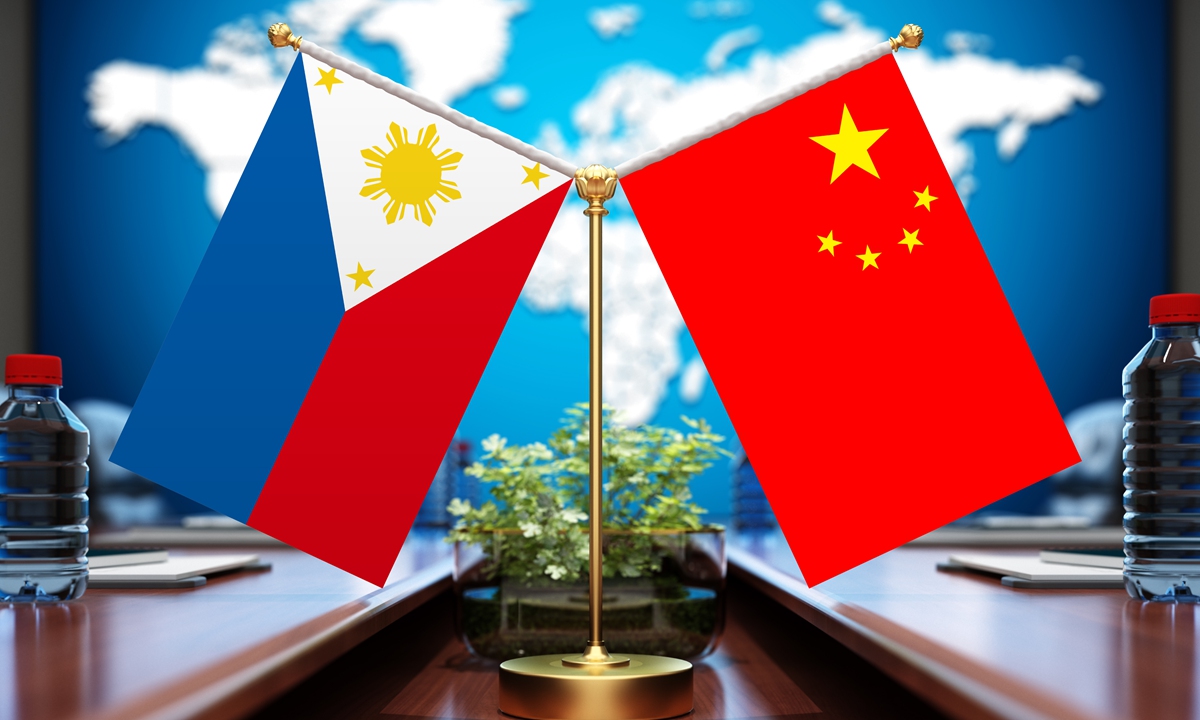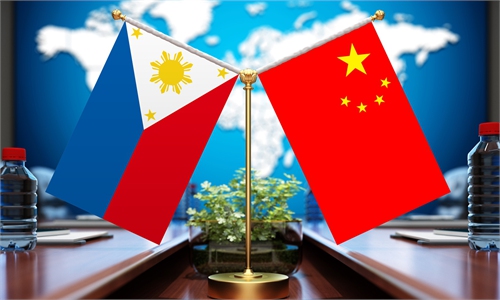Xi meets with Philippines' Marcos in Bangkok; Friendship, cooperation highlighted during a 'pleasant exchange'

China Philippines Photo:VCG
Chinese President Xi Jinping met with Philippine President Ferdinand Romualdez Marcos in Bangkok, Thailand on Thursday as both leaders called for the deepening of cooperation and enhancing of the China-Philippines friendship.
This is the first meeting between the two leaders, reflecting the legacy of friendship between China and the Philippines, and was a sign of enhanced cooperation, experts noted. Relations between the two sides are expected to continue enjoying the atmosphere of stability and friendship that has prevailed over the past few years.
Xi said that China always views China-Philippines relations from a strategic perspective and the two sides should jointly create cooperation highlights and increase cooperation quality. Xi said China is ready to continue its friendship and cooperation with the Philippines, work together for national development and rejuvenation, and write a new chapter in China-Philippines friendship, according to the Xinhua News Agency.
China is willing to maintain regular communication with the Philippines and continue to accommodate each other's concerns, Xi said, noting that the two sides should continue to deepen the synergy between the Belt and Road Initiative and the Philippines' "Build Better More."
On the South China Sea issue, Xi said the two sides should stick to friendly consultations and properly handle differences and disputes. He said both sides should uphold strategic independence, jointly resist unilateralism and acts of bullying, uphold fairness and justice, and safeguard regional peace and stability.
According to Xinhua, Marcos said that the two countries enjoy a thousand-year history of friendly exchanges. Since the establishment of diplomatic ties, bilateral cooperation in various fields has been advancing steadily.
China supports and helps the Philippines in its national development and has made important contributions to this end. The mutual trust between the two countries is increasing day by day, Marcos said.
The Philippines will continue to adhere to the one-China principle, the principle of peace and independent diplomacy, and will not take sides. The Philippines is willing to actively consult with China to explore joint development of offshore oil and gas, Marcos said.
Marcos described the meeting as a "very pleasant exchange," according to Philippine Office of the Press Secretary on Thursday night. Marcos also said that they spoke about regional issues and the plans for his upcoming state visit to China in January.
Marcos has been a witness to the friendship between China and the Philippines, having accompanied his mother on a visit to China in 1974, one year before diplomatic relations between China and the Philippines were established. Now, his meeting with Chinese leader shows a legacy of friendship, Xu Liping, director of the Center for Southeast Asian Studies at the Chinese Academy of Social Sciences, told the Global Times on Thursday.
China-Philippines relations have seen an overall positive momentum for the past six years and have promoted a comprehensive strategic cooperative relationship in recent years. This meeting between the two leaders has released consistent positive signals, Chen Xiangmiao, an assistant research fellow at the National Institute for South China Sea Studies, told the Global Times on Thursday.
The meeting also released signs that China and the Philippines will continue to strengthen cooperation, especially in key areas such as agricultural infrastructure and new energy, Xu said. "Continued friendly relations between China and the Philippines will also contribute to the development of relations between China and ASEAN as a whole."
Although the Philippines and the US have recently had closer military contacts, analysts do not believe this means the Philippines will accept the US strategy wholesale, nor does it mean it will affect cooperation between China and the Philippines in some areas.
On Tuesday, the Philippines said the US had agreed to spend $66.5 million to start building training and warehouse facilities at three of its military bases in the country, Reuters reported. In October, the US granted Philippines $100 million in foreign military financing.
But this does not mean that the Philippines will fully turn to the US, as Marcos' foreign policy has been one of making friends with the rest of the world, while he is also a pragmatic and rational leader, Chen said.
Marcos realizes that in the current situation, good relations and economic and trade cooperation between China and the Philippines can help address Philippines' domestic priorities, he noted.
US Vice President Kamala Harris is scheduled to visit the Philippines from Sunday to Tuesday, and her will reportedly feature topics such as the Taiwan question and the South China Sea.
Harris is expected to also talk about other regional hotspots, provide military assistance, negotiate a revision of the mutual defense treaty between the US and the Philippines, and further discuss the construction of US military bases in the Philippines, Chen said.
"While the US' intentions to provoke are very clear, the new Philippine government is in no way likely to become US cannon fodder," Xu said. "The Philippines does not want and cannot go back to the days of Aquino III."
"For now, Marcos has taken a relatively low-key approach to the maritime disputes, not making fundamental adjustments and maintaining a stable tone," Chen said.
"Across Southeast Asia, the US strategy of bloc confrontation is not popular, especially in traditional security areas," Chen said, noting that the countries prefer to engage in cooperation programs rather than accept the full US package to target China.
Since Marcos took office as President of the Philippines, the leaders of the two countries have maintained friendly high-level exchanges, including phone calls and congratulatory messages.
Marcos is said to pay an official visit to China in January 2023, according to Philippine media outlets.

